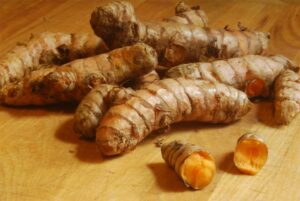For centuries, turmeric and inflammation reduction have been at the center of traditional medicine. This golden-hued spice has been praised for its powerful anti-inflammatory properties.
Recently, there has been a resurgence in interest in the potential health benefits of turmeric supplements for managing chronic diseases, from rheumatoid arthritis to inflammatory bowel disease.
Turmeric and Inflammation: Uncovering the Benefits

At the heart of turmeric’s remarkable effects on inflammation is the active compound called curcumin. Studies have shown that curcumin supplementation offers significant anti-inflammatory effects, even rivaling the effectiveness of some pharmaceutical drugs.
For instance, a double-blind placebo-controlled trial conducted on patients with active rheumatoid arthritis found that a turmeric extract containing only 500 mg of the curcumin phosphatidylcholine complex was just as efficient, if not more than the standard drug treatment.
Moreover, the power of turmeric extends beyond managing chronic inflammation. Researchers have explored the effects of curcumin on a variety of chronic diseases, including cancer, liver disease, and ulcerative colitis. Studies focusing on colorectal, breast, and human prostate cancer have demonstrated that curcumin inhibits the proliferation of cancer cells.
Additionally, a placebo-controlled trial showed that curcumin maintenance therapy can be an effective, safe, and well-tolerated treatment for ulcerative colitis. This versatile compound even shows promise in regulating the serotonin and dopamine system, which may help in alleviating the effects of chronic unpredictable mild stress.
Unraveling Turmeric’s Anti-Inflammatory Properties
Turmeric and inflammation have long been linked, with turmeric supplements being taken to alleviate inflammation and associated chronic diseases. Turmeric contains an active compound called curcumin, which is believed to be the primary source of its anti-inflammatory properties.
It’s been found that curcumin supplementation can have profound effects on individuals with rheumatoid arthritis. In a double-blind placebo-controlled study, participants who were treated with a turmeric extract saw significant improvements in their symptoms. These anti-inflammatory effects also extend to other inflammatory conditions, such as inflammatory bowel disease.
Remarkably, the benefits of curcumin don’t stop there. Research has shown that curcumin inhibits proliferation in various types of cells, including LnCAP prostate cancer cells and vascular smooth muscle cells. This potentially extends its applications to fighting a range of cancers, such as colorectal cancer, human prostate cancer, and even breast cancer.
Further studies have also uncovered promising results when using turmeric extracts in the treatment of liver disease and ulcerative colitis. In the case of colitis, a placebo-controlled trial found that patients who received an oral curcumin phosphatidylcholine complex showed a significant reduction in relapse rates at six months when compared to a placebo group. Similarly, curcumin maintenance therapy has been effective in improving markers of liver health.
Interestingly, the impact of curcumin appears to extend to mental health as well. Research has suggested that dietary curcumin can positively influence the serotonin and dopamine system in the brain, leading to potential improvements in mood and well-being.
Moreover, curcumin has demonstrated efficacy in reducing symptoms of chronic unpredictable mild stress, which could help to better manage overall mental health. Here’s a quick breakdown of turmeric’s anti-inflammatory applications:
– Rheumatoid arthritis
– Inflammatory bowel disease
– Prostate, colorectal, and breast cancer
– Liver disease
– Ulcerative colitis
– Mood improvement and stress reduction
In summary, it’s clear that the anti-inflammatory agent found in turmeric, curcumin, has a wide range of potential benefits. From alleviating symptoms of rheumatoid arthritis and inflammatory bowel disease to fighting various forms of cancer and presenting a potential alternative treatment for liver disease, the possibilities appear promising.
The future of curcumin will likely see further research to explore and validate these potential applications in the quest to better understand and harness turmeric’s anti-inflammatory properties.
Benefits of Turmeric in Managing Inflammation

Turmeric, a popular spice known for its vibrant color and distinctive taste, has attracted attention for its potential in managing inflammation. Its anti-inflammatory properties are linked to the compound curcumin, which is responsible for turmeric’s numerous health benefits.
One area where turmeric and inflammation research has gained significant attention is in treating rheumatoid arthritis. A double-blind placebo-controlled study found that a turmeric extract was more effective than a placebo in reducing joint pain and inflammation in patients with this condition.
Turmeric supplements have also shown promise in managing chronic diseases linked to chronic inflammation. For instance, curcumin supplementation has exhibited anti-inflammatory effects that can help alleviate symptoms of inflammatory bowel disease and ulcerative colitis.
A double-blind placebo-controlled trial observed that the addition of a curcumin phosphatidylcholine complex to standard ulcerative colitis therapy resulted in a higher rate of remission for patients using the curcumin maintenance therapy.
Interestingly, turmeric and inflammation research goes beyond treating physical ailments. Studies have shed light on the potential of curcumin to improve psychological well-being, especially in cases of chronic unpredictable mild stress. The benefits here are linked to the influence of curcumin on the serotonin and dopamine system.
Moreover, curcumin has displayed potential in cancer treatment by regulating cellular processes related to inflammation. In one study, oral curcumin was shown to slow down or inhibit the growth of LNCaP prostate cancer cells. Additionally, it also halted the proliferation of vascular smooth muscle cells, which play a critical role in the development of colorectal cancer.
The potential benefits of turmeric and inflammation extend to human prostate cancer, breast cancer, and liver disease, with dietary curcumin helping reduce the progression of these diseases. Turmeric extracts, specifically curcumin extract, have proven effective in patients with active rheumatoid arthritis as well, compared to a placebo-controlled trial.
In summary, the benefits of turmeric in managing inflammation are diverse and impactful. From treating rheumatoid arthritis to combating inflammatory bowel disease, turmeric supplements serve as a powerful anti-inflammatory agent.
Furthermore, turmeric extracts, particularly curcumin, show the potential in improving mental health and inhibiting the growth of cancer cells. Ultimately, turmeric’s widespread applications in treating chronic inflammation make it a valuable natural remedy.
Final Thoughts
Based on extensive research, it’s evident that turmeric and inflammation are closely linked, with turmeric supplements showing great promise as a natural anti-inflammatory agent. In various studies, turmeric has demonstrated benefits in a wide range of inflammatory conditions such as rheumatoid arthritis, inflammatory bowel disease, and colorectal cancer. The anti-inflammatory properties can be attributed to its active compound, curcumin.
Numerous double-blind placebo-controlled studies have been conducted to evaluate the effectiveness of turmeric extract and curcumin supplementation in alleviating chronic diseases caused by inflammation. The results have consistently shown positive outcomes, highlighting the anti-inflammatory effects of turmeric and curcumin extracts.
Some of the conditions where the benefits of oral curcumin have been observed include:
– Rheumatoid arthritis, where one study showed significant improvement after eight weeks of curcumin phosphatidylcholine complex compared to a placebo
– Ulcerative colitis, a clinical trial finding revealed that curcumin maintenance therapy significantly reduced the relapse rate in those with mild-to-moderate disease activity
– Liver disease, chronic unpredictable mild stress in rats was significantly reduced with dietary curcumin
Another vital area where curcumin has made strides is in cancer research. Studies on cancer cell lines such as LNCaP prostate cancer cells, vascular smooth muscle cells, and breast cancer cells, have shown that curcumin inhibits proliferation and induces cell death. Additionally, it appears that curcumin may have the potential in regulating the serotonin and dopamine system, which could offer support for those with mood disorders.
In conclusion, there’s substantial evidence supporting the relationship between turmeric and inflammation and the potential benefits of turmeric extracts in managing chronic inflammation and associated conditions. As research evolves, I believe turmeric will continue to play a significant role in promoting health and well-being. However, it’s essential to consult with a healthcare professional before incorporating turmeric supplements into your daily routine.

